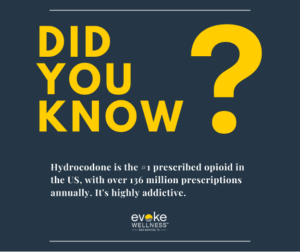You’ve likely heard of hydrocodone, a powerful prescription opioid painkiller. However, do you fully understand its dangers and the risks of addiction? This article provides key facts to know:
- Nearly 30% of people prescribed opioids misuse them, per the National Institute on Drug Abuse.
- Texas is experiencing a drug poisoning epidemic. The state’s drug poisoning deaths increased more than 75% in the past five years. In 2021, the drug poisoning death rate was 15.8 deaths per 100,000 residents. This is almost double the 2017 rate of 9.4 deaths per 100,000 residents.
Addiction can happen faster than you think. Learn about treatment options that can help you or your loved one break free from dependence on hydrocodone or other opioids. Discover how rehabilitation facilities provide customized care through prescription drug addiction programs as well as therapy for dual diagnosis substance abuse. Don’t wait – help is available.
What Is Hydrocodone?
Hydrocodone is a powerful opioid medication prescribed for moderate to severe pain relief. It belongs to the same drug class as codeine and oxycodone.
Highly Addictive
- Hydrocodone can be highly addictive, both physically and psychologically.
- Misuse can quickly lead to dependence and life-threatening respiratory depression.
Combination Products
Hydrocodone is often combined with acetaminophen to increase its effectiveness. Common brand names include Vicodin, Norco, and Lortab.
Abuse Potential
According to the DEA, hydrocodone products are among the most commonly abused prescription drugs in the United States
At Evoke Wellness, we offer comprehensive treatment for:
- Polysubstance abuse
- Prescription drug addiction
- Opiate addiction programs
- Fentanyl addiction treatment
- Substance abuse treatment programs
Our compassionate team provides evidence-based therapies to help you regain control. Reach out today to begin your journey to recovery.
Why Is Hydrocodone Prescribed?
Pain Management
Hydrocodone is a powerful opioid medication prescribed for the relief of moderate to severe pain. It works by changing how the brain and body respond to pain signals.
Common Uses
- Management of acute pain after surgery or injury
- Treatment of chronic pain conditions like arthritis or cancer
- Relief of severe cough and cold symptoms
Controlled Substance
As an opioid, hydrocodone carries a high risk of dependence and addiction. It is classified as a Schedule II controlled substance in the U.S. due to its potential for abuse and development of physical/psychological dependence.
How Hydrocodone Works in the Body
Opioid Receptor Binding
Hydrocodone is an opioid medication that binds to specific receptors in your brain, spinal cord and other organs. This binding triggers a cascade of effects that alter how your body perceives pain.
Pain Relief
The opioid receptors that hydrocodone binds to are found in pain pathways throughout your central nervous system. When activated by hydrocodone, these receptors disrupt the transmission of pain signals to your brain. This reduces your perception of pain.
Respiratory Depression
In addition to pain relief, hydrocodone can depress or slow your breathing by acting on respiratory centers in the brainstem. This side effect can be life-threatening if the dose is too high.
Euphoria and Addiction
Hydrocodone can also produce a sense of euphoria by impacting the brain’s reward pathways. This effect creates a high potential for abuse and addiction with repeated use.
Dangers and Side Effects of Hydrocodone
Respiratory Depression
- Hydrocodone can slow or stop breathing, potentially leading to respiratory failure and death.
- This risk increases when combined with other depressants like alcohol or benzodiazepines.
Addiction and Dependence
Hydrocodone is an opioid, carrying a high risk of tolerance, dependence, and addiction with long-term use.
Other Adverse Effects
- Nausea, vomiting, constipation
- Drowsiness, dizziness, confusion
- Low blood pressure, slowed heart rate
Seek medical help immediately if an overdose is suspected. Look for signs like pinpoint pupils, cold clammy skin, slowed breathing, loss of consciousness.
Hydrocodone Addiction and Dependence
Hydrocodone, a powerful opioid painkiller, carries a high risk of dependence and addiction. If you’ve been using it beyond its prescribed dosage or recreationally, you’re not alone – millions struggle with opioid dependence.
Signs of Addiction
- Cravings and obsessive thoughts about obtaining hydrocodone
- Continued use despite negative consequences
- Increased tolerance, needing higher doses to achieve effects
Physical Dependence
Even with legitimate use, your body can develop a physical dependence on hydrocodone. Stopping abruptly leads to withdrawal symptoms like:
- Muscle aches and insomnia
- Diarrhea and vomiting
- Anxiety and agitation
Don’t battle hydrocodone dependence alone. Reach out today for the support you need to regain control over your life and health.
Getting Help for Hydrocodone Addiction
Seek Professional Treatment
Overcoming hydrocodone addiction requires professional help. Look for rehab programs specializing in opioid addiction, offering medically-supervised detox and comprehensive behavioral therapies. These may include:
- Inpatient rehab providing 24/7 care and support
- Outpatient programs allowing you to live at home
- Support groups connecting you with others in recovery
Customized Care Plans
Effective treatment addresses the physical and psychological aspects of addiction. Qualified specialists will customize your care plan based on an assessment of your medical history and needs. Options may encompass:
- Medication-assisted treatment to ease withdrawal
- Individual and group therapy sessions
- Holistic approaches like yoga or art therapy
Continued Support
Recovery is an ongoing process requiring commitment and support. After completing a rehab program, continue prioritizing your sobriety through counseling, 12-step meetings, sober living homes or alumni support networks. Building a strong sober community increases your chances of lasting success.
Finding a Hydrocodone Addiction Treatment Program
Assessing Severity
Are you struggling with a hydrocodone addiction? The first step is honestly assessing how dependent you are. Signs of a severe addiction include taking higher doses than prescribed, “doctor shopping” for more pills, and experiencing withdrawal symptoms when stopping use.
Choosing the Right Facility
Not all rehab centers are equal. Look for programs that specialize in treating opioid addictions like hydrocodone. Inpatient or residential rehabs provide 24/7 monitoring and support during the difficult detox stage. Outpatient programs allow more flexibility if your addiction is less severe.
Paying for Treatment
The cost of rehab shouldn’t prevent you from getting help. Many insurance plans cover some or all of addiction treatment. There are also payment assistance programs and financing options available for those paying out-of-pocket. Your health is priceless – invest in your recovery.
Conclusion
You now have a deeper understanding of the dangers of hydrocodone addiction and the pathways to finding help. Armed with statistics on its prevalence and insights into treatment options like polysubstance abuse programs, prescription drug addiction counseling, opiate addiction interventions, fentanyl addiction rehab, and other substance abuse therapies, you can make informed choices. Reach out today to learn more about evidence-based treatments, find compassionate support communities, and take the first steps on your journey to reclaiming health and happiness. By acknowledging the problem and seeking solutions, you gain the power to overcome it.
Begin Your Journey with Evoke Wellness at San Marcos
If you or a loved one is considering treatment, Evoke Wellness at San Marcos invites you to contact us. Our compassionate team is ready to answer your questions, discuss your needs, and help you take the first steps toward recovery. At Evoke Wellness, you will find more than just a treatment program – you’ll discover a community dedicated to your wellness and success. Together, let’s embrace the journey to recovery and the promise of a new beginning. Call us at (833) 503-0734 today or reach out online.



